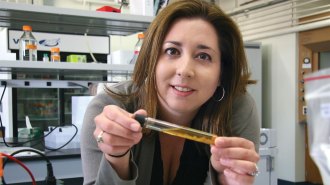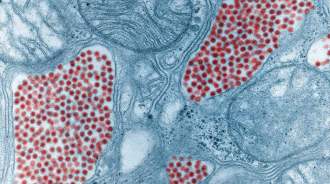Uncategorized
-
 Health & Medicine
Health & MedicineSeth Shipman recorded a movie in DNA — and that’s just the beginning
Seth Shipman is developing tools that may reveal hidden biological processes.
-
 Climate
ClimateAbigail Swann’s alternate Earths show how plants shape climate
Abigail Swann's studies reveal that water vapor from forests can affect drought patterns a hemisphere away.
By Susan Milius -
 Neuroscience
NeuroscienceMaryam Shanechi designs machines to read minds
Maryam Shanechi creates computer programs that link brain and machine to one day help patients with paralysis or psychiatric disorders.
-
 Life
LifeMichelle O’Malley seeks greener chemistry through elusive fungi
Michelle O’Malley studies anaerobic gut fungi, microbes that could help make chemicals and fuels from sustainable sources.
-
 Genetics
GeneticsStanley Qi gives CRISPR a makeover to redefine genetic engineering
By adapting CRISPR/Cas9, Stanley Qi has given genetic engineers a plethora of new tools.
-
 Science & Society
Science & SocietyParag Pathak uses data and algorithms to make public education fairer
Economist Parag Pathak has overhauled school choice systems across the United States. Now he’s assessing what makes for a good education.
By Sujata Gupta -
 Climate
ClimateMalin Pinsky seeks to explain how climate change alters ocean life
As global temperatures rise, Malin Pinsky’s research attempts to understand how marine ecosystems are changing and why.
-
 Physics
PhysicsMonika Schleier-Smith leads elaborate quantum conversations
Monika Schleier-Smith forces atoms to interact in ways that could offer insights into quantum computing, precision timekeeping and perhaps black holes.
-

Readers question killer macros and spinning wheels
Readers had questions about theoretical dark matter particles and textile archaeology.
-

Scientists who aren’t afraid to range across disciplines
Editor in Chief Nancy Shute discusses 10 early- and mid-career scientists who are making cross-disciplinary connections.
By Nancy Shute -
 Genetics
GeneticsDog behaviors like aggression and fearfulness are linked to breed genetics
A study looking at how 101 dog breeds behave finds a strong association between genetics and 14 personality traits.
-
 Health & Medicine
Health & MedicineRare eastern equine encephalitis has killed 9 people in the U.S. in 2019
2019 is the worst eastern equine encephalitis outbreak since tracking began in 2003, with 31 cases and nine deaths from the brain infection so far.
By Sofie Bates